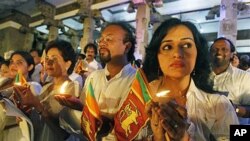A U.N. special investigator is accusing the Sri Lankan government of serious crimes against Tamil civilians in the last phase of the country's civil war that ended in 2009. The investigator has presented his report to the U.N. Human Rights Council.
Special Investigator on Extrajudicial, Summary or Arbitrary Executions Christof Heyns said a video broadcast last year of the final stages of the civil war in Sri Lanka presents credible evidence of crimes committed by the government against the Tamil people.
He said the video, which was broadcast by a British TV channel, shows naked people with their hands tied behind their backs being executed. He said these scenes were shot against the backdrop of corpses of other men and women, with similar head wounds.
Heyns said an investigation into the authenticity of the video has resolved a number of so-called unexplained elements.
“I believe that the prima facie case of serious international crimes have been made by the video that I examined," said Heyns. "I can obviously not make findings of guilt as would a court of law do. But the inquiry should now be taken to a further level on the international, as well as domestic, level.”
Special Investigator Heyns said extensive evidence obtained from independent experts show what is depicted in the video happened. He says he is concerned the government has not produced evidence of an independent study into what appears to be very serious crimes.
The Sri Lankan government denies charges that it committed violations of human rights and humanitarian law during its military offensive against the Tamil Tiger rebels. It accuses the United Nations and International community of being duped by a disinformation campaign orchestrated by the remnants of the Tamil Tigers.
Sri Lanka Minister of Plantation Industries Mahinda Samarasinghe vigorously defended his country’s record at the U.N. Human Rights Council. He said his government committed no crimes against the Tamil people.
On the contrary, he argued the government’s military action in May 2009, liberated his people from the clutches of terrorism.
“It is undeniable that the humanitarian operations in Sri Lanka resulted in the rescue of over 290,000 persons-innocent civilians-held hostage by a terrorist organization proscribed in over 30 countries," said Samarasinghe. "It is well to remember that in the wake of the September 11th tragedy, the U.N. invoked the right of self defense and called upon the international community to neutralize or combat such terrorism by non-state actors by its resolutions 1368 and 1373 of September 2001.”
The Sri Lankan minister said his country is taking steps at great cost to resettle and rebuild the lives of the people in the conflict-affected areas. He said charges that his government committed crimes against the Tamil population under the so-called guise of fighting terrorism are misplaced.
UN Investigator Accuses Sri Lanka of Crimes Against Tamils
- By Lisa Schlein




